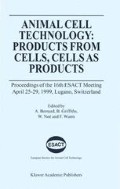Abstract
Hemolytic Disease of the Newborn (HDN) can be a life threatening condition in Rhesus D positive babies born from Rhesus D negative mothers. Successful prophylaxis in mothers is commonly based on the use of plasma-derived anti-D immunoglobulin preparations, which are rapidly becoming a scarce resource. In consequence, the substitution of the human derived polyclonal anti-D is both a health and an ethical concern. Several groups are involved in the expression of immunoglobulins anti Rh D in different hosts, including fused EBV-transformed human lymphocytes with murine myeloma (only IgG1) (Olovnikova, Belkina et al. 1997) and EBV-transformed B-lymphoblastoid cell lines (IgG1 and IgG3 subclasses) (Kumpel 1997). Among all the eukaryotic expression systems, CHO cells are still the most popular cell host for the production of recombinant proteins as human therapeutic agents (Wurm 1997), because of safety considerations, as well as practical issues related to scale up.
Access this chapter
Tax calculation will be finalised at checkout
Purchases are for personal use only
References
Jordan, M., A. Schallhom, et al. (1996). “Transfection of mammalian cells: optimization of critical parameters affecting calcium-phosphate precipitate formation”. Nucleic Acids Research 24(4).
Kumpel, B. M. (1997). “Monoclonal anti-D for the prophylaxis of RhD haemolytic disease of the newborn”. Transfus Clin Biol 4(41): 351–356.
Olovnikova, N. I., E. V. Belkina, et al. (1997). “Immunoglobulin G monoclonal human anti-rhesus Rho(D) to prevent rhesus-incompatibility“. Klin Med (Mosk) 75(7): 39–43.
Wurm, F. M. (1997). Aspects of Gene Transfer and Gene Amplification in Recombinant Mammalian Cells. Mammalian Cell Biotechnology in Protein production. R. W. Hansjorg Hauser. Berlin, Walter de Gruyter & Co: 87–120.
Author information
Authors and Affiliations
Editor information
Rights and permissions
Copyright information
© 1999 Kluwer Academic Publishers
About this chapter
Cite this chapter
De Jesus, M.J. et al. (1999). Establishing and Developing Cho Cell Lines for the Commercial Productoin of Human Anti-Rhesus D IgG. In: Bernard, A., Griffiths, B., Noé, W., Wurm, F. (eds) Animal Cell Technology: Products from Cells, Cells as Products. Springer, Dordrecht. https://doi.org/10.1007/0-306-46875-1_20
Download citation
DOI: https://doi.org/10.1007/0-306-46875-1_20
Publisher Name: Springer, Dordrecht
Print ISBN: 978-0-7923-6075-9
Online ISBN: 978-0-306-46875-9
eBook Packages: Springer Book Archive

